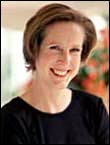I read the
"corrected" version and I'm wondering if that was the problem. I simply disliked this book. For one moment I became engrossed, thinking it was finally getting somewhere. That moment was short lived when the book ended a few pages later.
This is written, for the most part, as a stream of thought. The last chapter, and some of the dialogue elsewhere is written in standard English with a nod to grammar. The rest of the book is done at various times without punctuation, capitalization, or even adherence to any understandable time line. While that itself does not render the plot completely unfollowable, it does make it difficult.
There were a few different story lines playing out. The book was written from four different point-of-views. The first being the mentally handicapped brother, the second being the confused and internally tortured older brother, then we heard from the cruel and bitter younger brother, and finally in the third person. At no point were any of the question that arose answered. At no point was there any closure of any type. There was cruelty, incest (possibly, although it's never explicitly clear), and enough family issues to make for a two hour Jerry Springer special.
I've read the review, all rave, and I wonder what I've missed. I do not see this as a glimps into "the nature of man" and I certainly do not see where the "moral purpose" claimed by Ralph Ellison can be found. The story was dark, depressing, and without redemption. That does not, in my opinion, equate the nature of man. Perhaps it was the Godlessness of it all?
Finally, this novel reads like an unfinished work. However, I've read the "corrected" version and after reading the notes on that it appears they dug through Faulkner's papers and just added in everything from the
original unedited version, and it very well could be that they, in essence, unedited it to the point where it WAS the unfinished work. There was no real beginning, no real ending, and I have to wonder if dumping out the work of the editor was the best idea.










